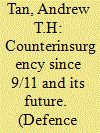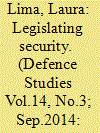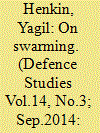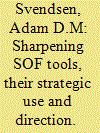|
|
|
Sort Order |
|
|
|
Items / Page
|
|
|
|
|
|
|
| Srl | Item |
| 1 |
ID:
132723


|
|
|
|
|
| Publication |
2014.
|
| Summary/Abstract |
Recent US experience in Iraq and Afghanistan has proven that COIN, however revised and updated to fit the globalised era in which we live, is a problematic and ineffective solution to the irregular warfare waged by insurgents. The United States and the West in general will have to accept the chastening lessons of Iraq and Afghanistan lest they repeat it: that they are not good at waging COIN and must try to avoid getting involved in such costly campaigns again. If intervention abroad has to be undertaken, it will have to fulfill a set of demanding conditions. Nonetheless, while COIN in its contemporary guise has failed to deliver long-term, tangible results, thinking about how to counter asymmetric challenges, including the waging of irregular warfare, cannot be ignored, given the likelihood that external interventions will continue to be required in the future. Moreover, while COIN as the basis of a grand strategy is unrealistic, some of its basic principles are useful in orientating future approaches to insurgencies and terrorism towards comprehensive and collaborative approaches, as opposed to merely hard security operations unilaterally undertaken by States, which fail to address the underlying fundamental causes of political violence and which undermine long-term legitimacy
|
|
|
|
|
|
|
|
|
|
|
|
|
|
|
|
| 2 |
ID:
132724


|
|
|
|
|
| Publication |
2014.
|
| Summary/Abstract |
This article examines the traditional conceptions of security and defence in Brazil. It does so by investigating their introduction in the political and legal vocabulary in Brazilian legislation. It further explores these terms as part of a project of militarization of the state and society which peaked during the Estado Novo dictatorship (1937-1945). Legislative sources and political writings of the time are thus used to corroborate the historical analysis and two main arguments: (1) conceptual innovations introduced in legislation allowed the armed forces to establish its monopoly over specific policy areas and, later, (2) to legally exercise control over civilian life. As such, it highlights the early relationship established between Brazilianess and development and argues that speaking security enabled authoritarian sectors to put forward their own project of development.
|
|
|
|
|
|
|
|
|
|
|
|
|
|
|
|
| 3 |
ID:
132726


|
|
|
|
|
| Publication |
2014.
|
| Summary/Abstract |
In recent years, the idea of 'swarming' - that is, simultaneous multidirectional attack or maneuver by large number of independent or semi-independent small units - became a subject of a heated debate. Some believe this is the future of warfare, while others see this belief as ridiculous and dangerous. In the Israel Defense Forces (IDF), specifically, swarming was heralded as the new way of war before the 2006 Second Lebanon War. But during and after the war, the word itself was turned into a derogatory term, symbolizing all that was wrong with the IDF's performance: relying on new, untested and unrealistic concepts to pretend that the Army has a silver bullet which will solve its problems quickly and easily, ignoring reality in the process. This article draws on six historical case studies, from the American airborne operation in the Normandy Invasion to the Second Lebanon War, to examine the method of swarming, its relevance and its uses. Finally, the article concludes that Swarming is not a revolutionary method, and not 'The future of conflict'. However it is a very useful method in certain situations, provided that commanders know and understand its possibilities and limitations.
|
|
|
|
|
|
|
|
|
|
|
|
|
|
|
|
| 4 |
ID:
132725


|
|
|
|
|
| Publication |
2014.
|
| Summary/Abstract |
Focusing on contemporary Special Forces (SOF/SF), this article analyses expanding SF developments in the context of conducting rapidly proliferating multi-functional operations during an overall era of globalised strategic risk. This is while SF simultaneously have to negotiate the not necessarily reconcilable challenge of wider national-to-global-impacting defence transformation and military cuts, which include extending to closely impacting on SF support units. When examining the optimisation of the command of special operations, including better developing Special Operations Commands (SOCOMs) or closest nearest equivalents, and when evaluating the attendant advancement of what can be best characterised as the improved strategic direction and use of SF, several helpful operational-to-strategic and structural-to-cultural lessons soon emerge. For both now and for differently ranging futures, further consideration of these noteworthy lessons is warranted.
|
|
|
|
|
|
|
|
|
|
|
|
|
|
|
|
|
|
|
|
|